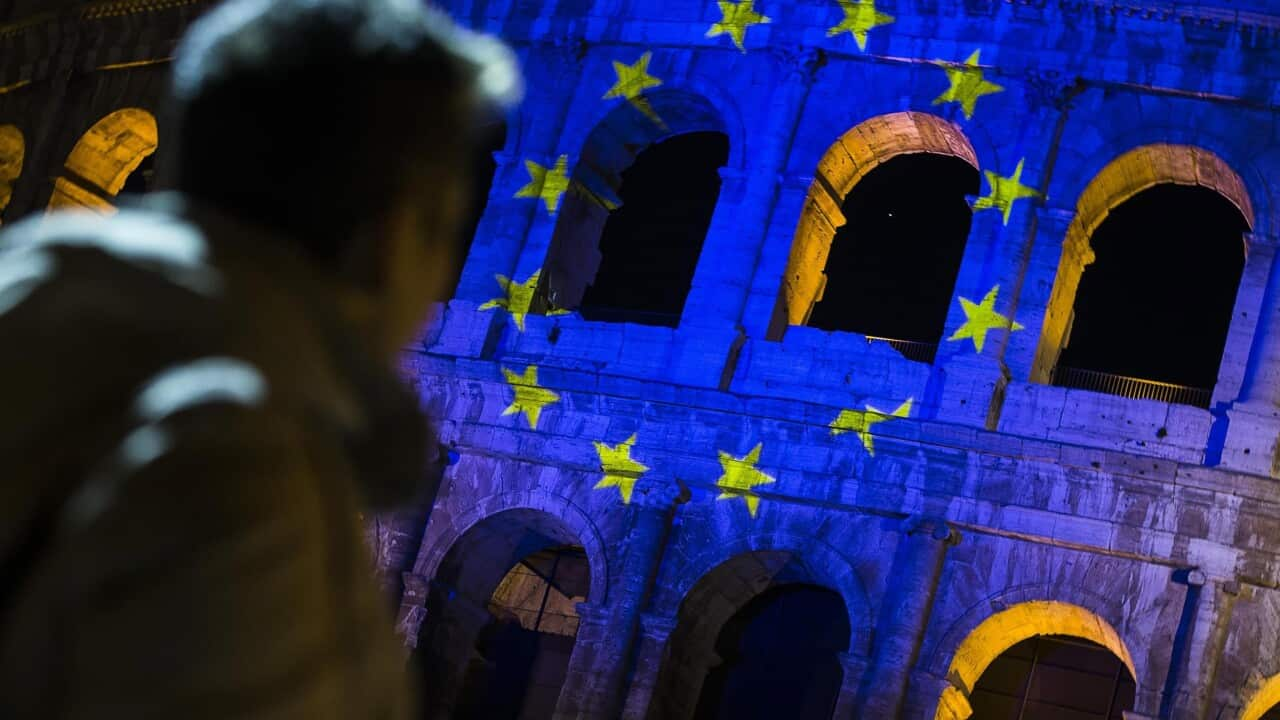European Union leaders are meeting in Rome to renew their vows on the 60th anniversary of the bloc's founding treaties during a special summit to show unity despite Britain's looming exit.
The 27 leaders are meeting to endorse a declaration of intent for the next decade in the same Renaissance-era palace where six founding countries signed the Treaty of Rome in 1957.
EU President Donald Tusk has called for leadership to steer Europe out of crisis.
"Prove today that you are the leaders of Europe, that you can care for this great legacy we inherited from the heroes of European integration 60 years ago," Mr Tusk said.
Pope Francis warned on the eve of the summit that the crisis-ridden bloc "risks dying" without a new vision. The White House has congratulated the EU on its 60th birthday, in a notable shift in tone for President Donald Trump's administration, whose deep scepticism about the bloc has alarmed Brussels.
The White House has congratulated the EU on its 60th birthday, in a notable shift in tone for President Donald Trump's administration, whose deep scepticism about the bloc has alarmed Brussels.

Pope Francis poses with the heads of State and of the EU institutions for a photo in the Sistine Chapel. Source: L'Osservatore Romano
But British Prime Minister Theresa May's absence from the summit, four days before she launches the two-year Brexit process, and a row over the wording of the Rome declaration, underscore the challenges the EU faces.
Security is tight with snipers on rooftops, drones in the skies and 3,000 police officers on the streets as Italy takes no risks following an attack this week in London claimed by Islamic State.
'Our common future'
The Rome Declaration proclaims that "Europe is our common future", according to a copy obtained by AFP, after a series of crises that have shaken its foundations.
Mass migration, the eurozone debt crisis, terrorism and the rise of populist parties have left a bloc formed from the ashes of World War II searching for new answers.
Yet the leaders are deeply divided over the way forward almost before they have started.
Polish Prime Minister Beata Szydlo only agreed to sign the declaration at the last minute, after bitterly opposing a reference to a "multi-speed" Europe favoured by powerhouse states France and Germany.
Poland, central Europe's largest economy, is concerned that as one of nine of the EU's current 28 members outside the eurozone, it could be left behind should countries sharing the single currency push ahead with integration.
Greece, the loudest voice against the austerity policies wrought by its three eurozone bailouts, meanwhile insisted that the document should mention social policies.
In his hard-hitting message on the eve of the summit as he met the EU 27, the pope echoed this theme and urged the bloc to focus on the principles of solidarity and social justice on which it was founded.
"When a body loses its sense of direction and is no longer able to look ahead, it experiences a regression and, in the long run, risks dying," Francis said in a speech at the Vatican City.
Protests in Eternal City
Apart from the declaration itself, the Rome summit is short on politics, with only a short discussion and lunch plus a family photo on the schedule.
The aim is to channel the spirit of the Treaty of Rome that Belgium, France, Italy, Luxembourg, The Netherlands and West Germany signed six decades ago to create the European Economic Community (EEC).
The treaty was signed in the Horatii and Curiatii hall of the Palazzo dei Conservatori, one of the Renaissance palaces that line the Michelangelo-designed Capitoline Square, and the political and religious heart of the Roman Empire in ancient times.
Police in the Eternal City are on the alert not only for lone wolf attackers in the wake of the British parliament attack on Wednesday, but also violent anti-Europe demonstrators.
Around 30,000 protesters are expected to take part in four separate marches - both pro- and anti-Europe - throughout the day. Police plan to stop all traffic and declare a no-fly zone.





